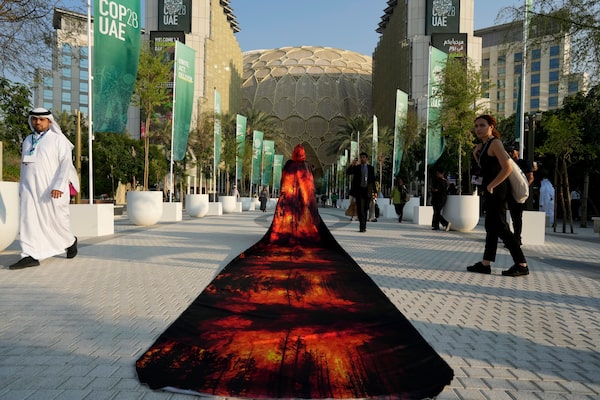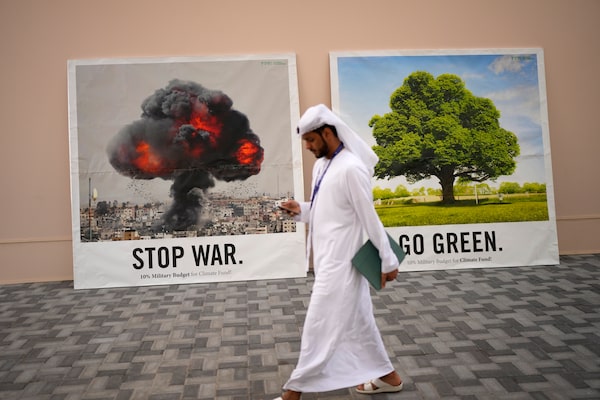
Islene Facanha, of Portugal, participates in a demonstration dressed with images of wildfires at the COP28 U.N. Climate Summit, on Dec. 8, in Dubai, United Arab Emirates.Peter Dejong/The Associated Press
The annual UN climate conferences are always high on drama and low on progress, let alone breakthroughs, until they go into overtime at the end of their second week. The COP28 climate jamboree in Dubai, which began Nov. 30, did not deviate much from the familiar playbook, which is not to say it lacked memorable moments – some dubious, some worthy of restrained applause. Herewith my list of the highs and lows so far.
High: Climate finance
Decades in the making, the Dubai summit formally adopted a loss and damage fund on its opening. It was billed as a breakthrough, though most of the hard work was done at the previous summit, in Sharm el-Sheikh, Egypt. The fund will provide financial assistance to generally poor countries hit hard by floods, droughts and other climate crises. So far, the fund has been backed with about US$800-million in pledges, including US$100-million from the United Arab Emirates and a similar amount from Germany. It was a good start, though the repair bill is expected to total hundreds of billions over the next couple of decades as the planet heats up.
Low: Miserly America
The United States, the world’s biggest economy and most egregious historic emitter of carbon emissions, pledged a mere US$17.5-million, not much more than Canada, to the loss and damage fund. It was a shabby PR move that suggested Washington doesn’t approve of the fund or at least not its governance – the World Bank will oversee it at first. A more elegant solution would have been to pledge nothing up front while dropping a generic statement saying the financial commitments are “pending, subject to a review” or similar.
High: Azerbaijan in the running
The small former Soviet republic on the Caspian Sea is now tipped to host COP29. The news that Azerbaijan has emerged as the front-runner came after it and neighbouring Armenia this week struck an agreement that would see each side release servicemen captured in the Second Nagorno-Karabakh War, in 2020. The diplomatic coup means Armenia will no longer oppose Azerbaijan’s COP29 bid. The event was supposed to be somewhere in the eastern European Union, but the Russians, under EU sanctions, nixed the idea. The bad news, at least for the green crowd, is that Azerbaijan, like the United Arab Emirates, is an oil producer that might resist any demand to hand a death sentence to fossil fuels.

The annual UN climate conferences are always high on drama and low on progress, let alone breakthroughs, until they go into overtime at the end of their second week.Rafiq Maqbool/The Associated Press
Low: Sorry, Bonn
Critics of COP28′S carnival-like atmosphere – the event is stuffed with a record 70,000-plus participants – were quietly hoping that infighting over the location of COP29 would allow Bonn to host the event. The UN climate body’s headquarters are in the German city, and it is the default host unless another city wins the prize, which typically happens. Bonn’s small size and convention sites would have forced COP29 to slim down drastically, propelling the event back to its early format, when attendance was 5,000 to 10,000 and negotiating a climate treaty, not hosting a mob-scene party, was the name of the game.
High: John Kerry
The U.S. Climate Envoy unveiled a crackdown on his country’s methane emissions at COP28 that would see them fall by 80 per cent by 2038. Methane is bad news for the planet, since it is as much as 80 times more powerful at trapping heat than carbon dioxide. “We think it’s the easiest, quickest and cheapest way to start making gains against global warming,” Mr. Kerry said.
Low: Junk science shocker
During the first week of COP28, The Guardian and the Centre for Climate Reporting revealed that Sultan Al Jaber, the COP28 president and head of the Abu Dhabi National Oil Co., said in an October video call that there was “no science” indicating that the phase-out of fossil fuels was needed to prevent average global temperatures from rising beyond 1.5 degrees Celsius, when ample science says the opposite. Of course, the sultan claimed his remarks were misrepresented and that, in truth, he believed that the phase-down and eventual phase-out of fossil fuels was “inevitable and in fact essential.” Which of his remarks to believe?
High: Canada, incredibly
Canada was asked by Sultan Al Jaber to help develop language on the potential phase-down or phase-out of fossil fuels, Canadian Environment Minister Steven Guilbeault said Friday morning. The invitation came shortly after Canada announced a cap on oil and gas industry carbon emissions that would see them fall by more than a third below 2019 levels by 2030, partly with the help of offset credits and payments into a decarbonization fund. Mr. Guilbeault said he was confident that “historic” language on fossil fuels in COP28′s final text could be agreed upon. Don’t count on it. A week is a long time at any COP summit, and what is envisioned today could be excised tomorrow. “Phase-out” could be replaced with “phase-down” or fudges such as an agreement to “accelerate efforts” to phase down oil and gas. Still, it’s encouraging to see Canada avoid being dismissed as a hopeless petrostate bent on burning every last molecule of carbon it owns.
 Eric Reguly
Eric Reguly